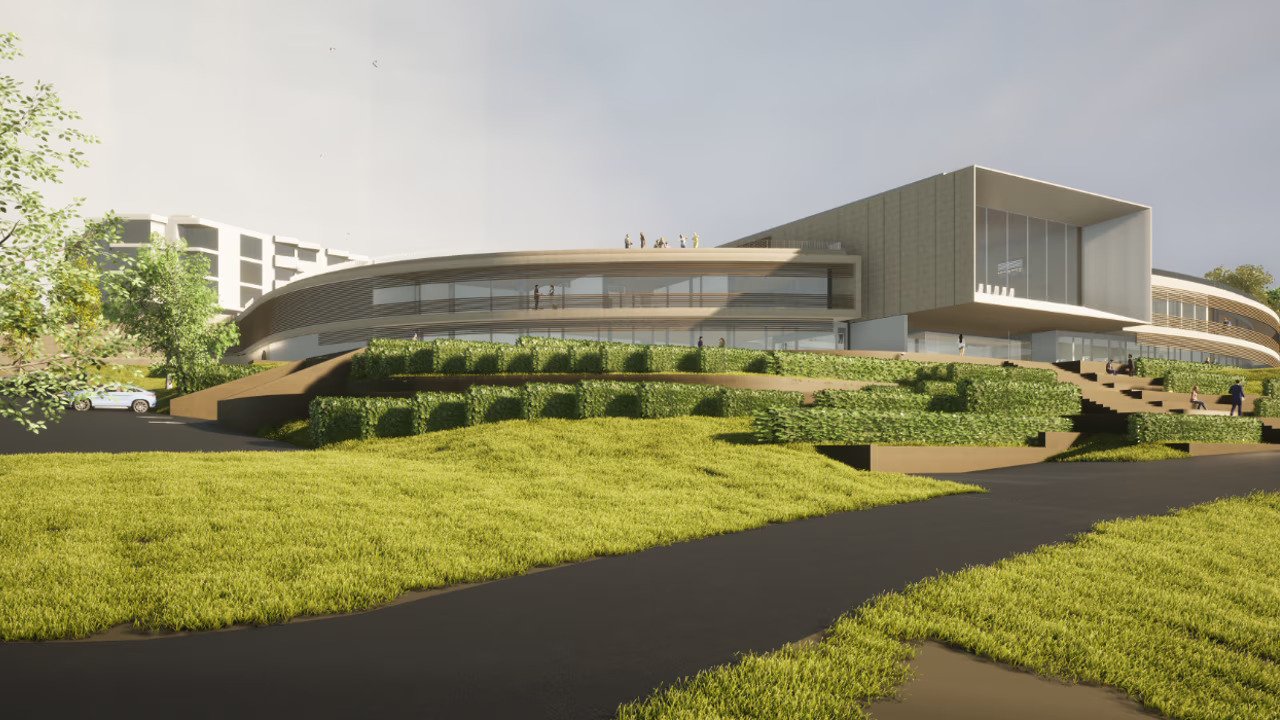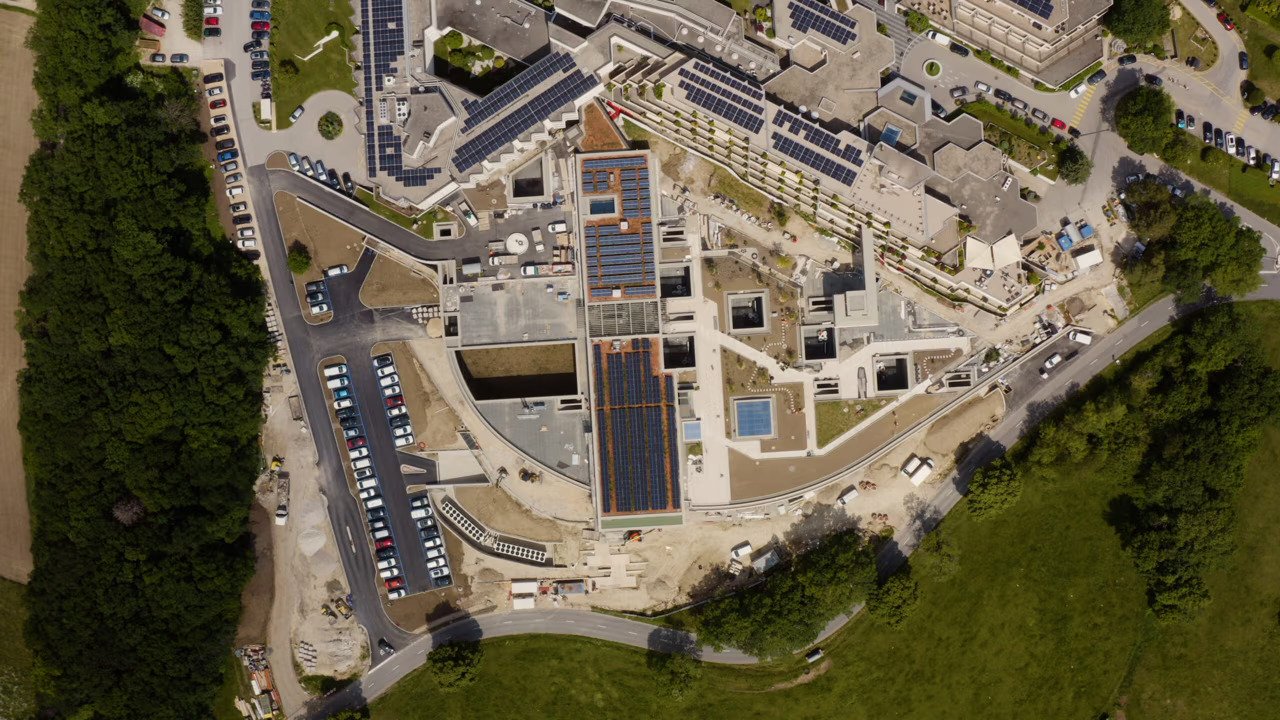In Switzerland's picturesque "Health Valley," nestled just 15 minutes from Geneva Airport and overlooking Lake Geneva and the Alps, a new kind of medical innovation ecosystem is taking shape. The Genolier Innovation Hub, opened in 2024, aims to bridge the persistent gap between research and real-world clinical application by uniting researchers, physicians, startups, and industry leaders under one roof to facilitate the implementation of research projects and their application in clinical settings.
I spoke to CEO Anna Gräbner to find out more.
The Genolier Innovation Hub spans approximately 25,000 square meters across four floors. Construction started in 2022, and the total investment was 110 million CHF (approx €118 million).
It's open to innovations in medtech, pharmacology, digital technologies, and biosciences.
It hosts partners and residents on site, from startups to large players like Novartis, GE Healthcare, Medtronic, Johnson & Johnson, Pfizer, and others. CERN, which is just 15 minutes away, is also a partner, with plans to have a bunker in the Hub for medical research.
Taking ideas from "bench to bedside"
According to Gräbner, the whole idea of the campus is to support translational research— "taking ideas from bench to bedside. We support startups that have graduated from the incubator stage. We are not an incubator ourselves, but we work closely with many, offering startups a next step toward clinical application."
Many hospitals lack the time and resources to support implementation or clinical validation.
"And while Switzerland has excellent incubators and strong investment opportunities, we still have a problem", shared Gräbner.
"87 per cent of medical startups in Switzerland fail. That's because, although they may receive early-stage funding, they often fail to meet real clinical needs.
That's why we built the Genolier Innovation Hub. We invested 110 million Swiss francs to bring all the actors under one roof and develop innovations that actually make sense in the clinical setting."
A health innovation ecosystem all under one roof
According to Gräbner, guests come for several reasons. First, the Hub is only about 15 minutes from Geneva International Airport and enjoys panoramic views of the Swiss Alps and Lake Geneva.
Further, "we're located in the so-called' Health Valley," which is similar in concept to Silicon Valley. There are many healthcare actors based around the lake. Being in this region is very important for us as a hub."
But the Hub's real added value, and why these big companies come to stay, is that it provides a real clinical environment.
It has a clinic on campus which treats a wide variety of patients and covers nearly all specialities except paediatrics. It includes over 400 physicians and is part of the Swiss Medical Network group, which consists of 23 hospitals and about 70 medical centres across Switzerland.
"That makes for a huge network of physicians who are involved here in research, training, and innovation development," shared Gräbner.

Genolier Innovation Hub also has the Renaissance Clinic that specialises in preventive and regenerative medicine. That includes sports medicine, performance checkups, and everything related to cell therapies, healthspan and lifespan-related research.
Besides the established clinics, there are 11,000 m² of fully modular rental space including offices, labs, clean rooms, surgical rooms, radiotherapy bunkers, and technical facilities.
There are also training spaces on premises, such as a big auditorium, with telescopic seating, LED walls, and high-resolution streaming. It is designed for medical conferences, training, and even live connections to operating rooms and labs.
Only post-regulatory startups and scaleups need apply
Pharma, medtech, digital technologies, and biosciences startups interested in joining Genolier Innovation Hub are assessed by three main criteria,
The first is maturity. If they're early-stage, they are instead connected to the Hub's partner incubators.
Gräbner explained, "We're focused on the post-regulatory phase — startups coming out with CE mark, FDA approval, or Swissmedic certification. Switzerland isn't part of the EU, so we also need companies to be aware of that regulatory nuance."
Second, the Hub is not a permanent base, but rather like a hotel for companies.
"Come in, fine-tune your product, collaborate with physicians and patients, and then leave. Of course, you're welcome to return, but we need constant turnover. Our keyword is flexibility, explains Gräbner.
It's an ethos that extends to the building's architecture. All walls and surfaces can be adapted to meet each company's needs. Buildings are connected by tunnels and bridges, allowing quick movement and collaboration.
Third — and most importantly — the innovation must address a real clinical pain point. Gräbner explained that the Hub uses a bottom-up approach, identifying needs from physicians, medical staff, and patients.
"Patients are the ultimate experts — they've lived through the illness. Listening to them is vital. So we match those needs with tailored solutions. Even with 25,000 square meters, space is limited, and we're very selective."
Genolier tackles the innovation bottleneck
Part of the mission of the Hub is to accelerate innovative treatment solutions to patients. According to Gräbner, in Switzerland, the average time from lab to bedside is about 17 years.
"Part of that is regulatory, but much of it is simply a lack of capacity in hospitals to evaluate every new technology.
The Hub is designed to reduce that latency. Co-location helps: our clinicians, startups, and engineers all work side by side. Physicians can drop in over lunch to see a prototype or meet a startup team. It leads to real collaboration and faster decision-making."
Gräbner had a final message for the readers:
"You're always welcome to visit us. You really have to experience it in person to understand what we're building."
Lead image: Genolier Innovation Hub. Photo: uncredited.



Would you like to write the first comment?
Login to post comments